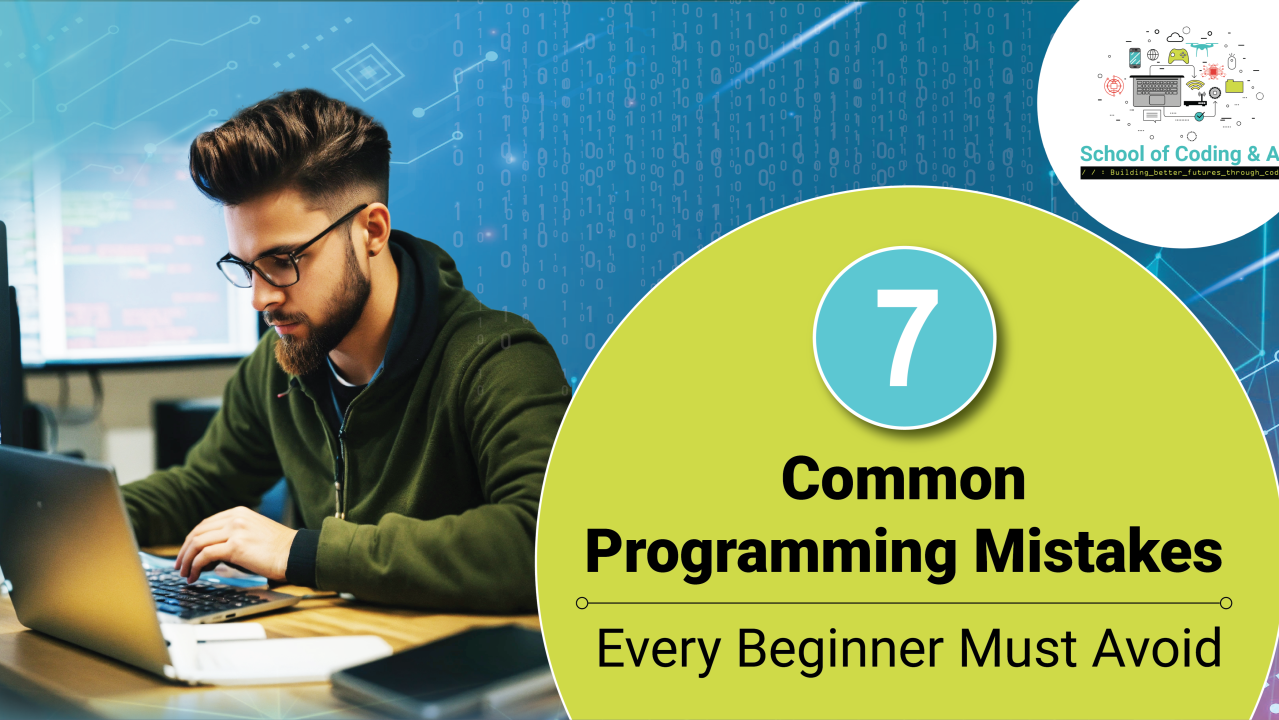
7 Common Programming Mistakes Every Beginner Must Avoid
School of Coding & AI
Transforming Futures with the UK’s Leading Coding & AI Training Provider | Equipping Individuals & Businesses for Succes
Introduction?
Learning to code is an exciting journey, but for beginners, it can also be fraught with mistakes that hinder progress. While errors are a natural part of the learning process, knowing which mistakes to avoid can save time, reduce frustration, and help programmers develop stronger foundations. In this article, we'll explore the 7 common programming mistakes that every beginner must avoid. By recognizing and addressing these pitfalls early on, you can boost your productivity, write cleaner code, and build confidence in your programming abilities.
1. Neglecting Proper Code Formatting and Comments
One of the most common mistakes that new programmers make is neglecting proper code formatting and skipping comments. While it might seem unnecessary in small projects, poorly formatted code becomes increasingly difficult to read and debug as your programs grow. Comments serve as helpful guides for both you and anyone else who might read your code later.?
Why it matters: Clean and well-commented code is essential for collaboration, code maintenance, and scalability. It’s also a sign of professionalism in the programming community.
Tip: Use consistent indentation, follow naming conventions, and include comments to explain complex logic.
2. Ignoring Error Messages and Warnings??
Beginners often overlook or disregard error messages and warnings, assuming they aren’t important. In reality, these messages are crucial to understanding where your code is failing and how to fix it. Error messages provide clues that help you troubleshoot issues quickly, while warnings signal potential problems that could affect the performance or security of your code.
Why it matters: Ignoring errors and warnings can lead to bigger problems down the line, such as bugs, crashes, or security vulnerabilities.
Tip: Take time to read and understand each error message. Use debugging tools to pinpoint the issue and resolve it immediately.
3. Trying to Do Too Much at Once (Lack of Focus)??
Programming is complex, and trying to learn multiple languages or tackle too many projects at once is a common mistake. Beginners often feel pressured to master everything quickly, but this lack of focus can lead to confusion and burnout. It’s more effective to focus on one language or project at a time to fully understand its concepts before moving on.
Why it matters: Jumping between different languages or projects without a solid foundation can slow down your progress and diminish your coding confidence.
Tip: Start with one language and break larger projects into smaller, manageable tasks to maintain clarity and focus.
4. Hardcoding Values Instead of Using Variables??
A major mistake beginners make is hardcoding values directly into their programs instead of using variables. While hardcoding might seem simpler at first, it can lead to inefficiencies and make your code harder to maintain in the long run. Using variables allows for flexibility and makes your code more reusable.
领英推荐
Why it matters: Hardcoded values make it difficult to update your program and introduce inconsistencies when making changes.
Tip: Always use variables and constants where applicable, and ensure they are appropriately named for clarity.
5. Not Testing Code Regularly (Skipping Debugging)??
A key principle in programming is "Test early, test often." However, beginners sometimes write large chunks of code without testing it along the way, which can lead to a build-up of errors that are harder to track down. Testing as you go ensures that each function works as expected and makes debugging easier.
Why it matters: Regular testing helps identify errors at an early stage and prevents problems from escalating.
Tip: Break your code into smaller, testable functions and use unit tests to verify that everything works as intended before moving on.
6. Failing to Use Version Control??
Beginners often overlook the importance of version control tools like Git. These tools allow you to track changes in your code, collaborate with others, and roll back to previous versions if something goes wrong. Not using version control can lead to lost progress or irreversible mistakes when experimenting with your code.
Why it matters: Version control provides a safety net and makes it easier to manage and collaborate on projects.
Tip: Start using Git early in your coding journey, even for personal projects. Familiarize yourself with commands like commit, push, and branch to manage your code effectively.
7. Overcomplicating Solutions (Not Keeping It Simple)??
Many beginners fall into the trap of overcomplicating their code. In an attempt to demonstrate their skills, they write convoluted solutions to simple problems. This not only makes the code harder to understand but also introduces unnecessary bugs. The best solutions are often the simplest and most efficient.
Why it matters: Simplicity is a key principle in programming. Overcomplicated code can be difficult to maintain, debug, and scale.
Tip: Always aim for clarity and simplicity in your code. Before finalizing a solution, ask yourself if there’s a more straightforward way to achieve the same result.
Conclusion??
Programming is a skill that takes time and practice to master, but by avoiding these seven common mistakes, beginners can set themselves up for success. Whether it’s focusing on one language, paying attention to error messages, or using version control, small changes in approach can make a big difference in your coding journey. Remember, the goal is not just to write functional code but to write clean, efficient, and maintainable code that grows with your skills. Keep learning, keep experimenting, and don’t be afraid to make mistakes—as long as you learn from them!